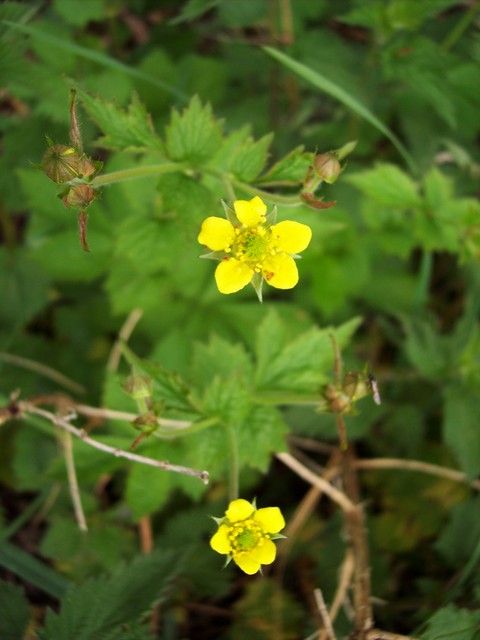
The rhizome (radix gei) is the only part of the herb which has medicinal usages. It has a cylindrical shape and measures about 1 inch in diameter. Due to the secretion of eugenol, a volatile chemical substance, the rhizome as well as its roots give off a pleasant clove smell. It should be noted that rhizomes and the roots are uprooted either in the springtime, before the appearance of leaves or in the fall when the cocnnetration of eugenol is higher. In November, the concentration of the active substances contained - like tannin - is the highest.
wood avens plant For therapeutic purposes, rhizomes are used in their dry form. After being uprooted, the roots are washed with cold water and are then laid in thin layers in the sunlight or in rooms without humidity with temperatures of 35 degrees Celsius. The process of drying ends as soon as the roots assimilate a ligneous appearance, easily breakable. The quantity of dry substance obtained from 2-3kg of fresh roots is about 1kg.
Proprieties and benefits of Wood Avens
Tannin (10-20%), saccharose, starch, bitetr substances and mineral salts are the predominant chemical substances contained by the herb. The presence of tannin in cerentel ensures that wood avens can effectively alleviate stomach afflictions, infectious diarrhea, liver or biliary disorders. As it was previously mentioned, wood avens also contains eugenol, a substance with multiple usages in medicine and stomatology. The herb has astringent effects (eliminates painful muscular contractions), analgesic effects (it alleviates pain), antiseptic (keeps bacteria infections away), soothing (at intestinal level) and haemostatic effects (it can stop bleedings and soothe the haemorrhoidale pain).
Treatments and mixtures
Some of wood avens's usages are as follows. Due to the fact that it is a good disinfectant, the herb is recommended in alleviating enterocolitis and menstrual pains (because of its haemostatic properties it can stop bleedings). As an astringent, the herb effectively treats diarrhea and intestinal infections. Other usages of the plant are noticeable in internal treatments: pharyngitis, amygdalitis, bronchitis, asthenia, depressions and even cancerous diseases. As an antiseptic, it is good for gargling in case of toothaches, dental abscesses, amygdalitis, stomatitis, gingivitis and plaques.
Wood avens powder
Wood avens powder. Half of spoonful of powder administrated three times a day for two weeks is the ideal treatment against pharyngitis, amygdalitis and bronchitis. In cases of intestinal infections and diarrhea, the dosage is increased to four spoonfuls of powdered root a day. Against weak states and anemia produced by bleedings, an initial dose of 2-3 spoonful of powder is administrated, after which the treatment is continued with one spoonful of powder four times a day for five straight days.
Wood avens infusion
Wood avens infusion. This mixture can successfully treat stomatitis and gingivitis if gargling is done three times a day for a period of one to two weeks. It is efficient also for depressive, melancholic states and fatigue by being administered a cup of this mixture twice a day for six weeks. After a pause of two weeks the treatment can be resumed.
wood avens By combining powdered root of wood avens with the infusion, a mixture is made that is efficient in treating cancerous disorders because it amplifies the assimilation processes and also it maintains the physical and psychic tonus. Thus, before each important meal, a cup of wood avens infusion in which half a spoon of powdered herb was dissolved is consumed.
Wood avens tincture
Wood avens tincture. Owing to its anesthetic proprieties, a wad moisted in tincture and used as a poultice can alleviate toothaches. This tincture can also be used for massages to eliminate muscular strains.
Warning
An overdose can trigger nausea states. Also it is not recommended for the products based on wood avens to be consumed between meals, because it can sometimes produce gastro-intestinal irritations. In hepatic afflictions the consumption of wood avens is not indicated.
No comments:
Post a Comment